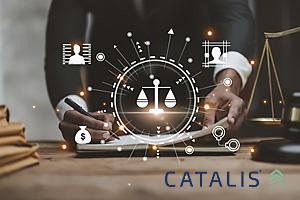Cloud Computing has become the norm in recent years and it offers many benefits for courts case management systems and software products.
 By Pat Harper, Chief Technology Officer, Catalis
By Pat Harper, Chief Technology Officer, Catalis
At Catalis, our Courts Management System (CMS) is based on Pioneer Benchmark and the rich set of functionality it brings to the market. Pioneer Benchmark has historically been a premise-based solution with a desktop client. Going forward, this solution is transformed into a cloud-based system with a refreshed Web front-end and a multi-tenant database that can be implemented for an entire state. In fact, the first South Carolina counties will go live on Catalis Courts Management in 2024.
 The benefits that Cloud Computing brings to the court systems are similar to that for other products. They include scalability, accessibility, security, reduced costs, etc. There are other tech posts that talk about these benefits in detail. For courts, however, there are additional benefits for our cloud-based system that directly impact the efficiency of courts and differentiate Catalis in the marketplace.
The benefits that Cloud Computing brings to the court systems are similar to that for other products. They include scalability, accessibility, security, reduced costs, etc. There are other tech posts that talk about these benefits in detail. For courts, however, there are additional benefits for our cloud-based system that directly impact the efficiency of courts and differentiate Catalis in the marketplace.
The Catalis CMS is developed using the Agile methodology, which brings to bear the ability to iterate features into the product quickly. No longer are major releases and downtime required to update the system. Catalis CAMS allows courts to receive software updates and new features on a regular basis without needing to schedule downtime or update software. This is because Catalis is responsible for maintaining and updating the software, including iterating on the system’s capabilities through automated deployment pipelines. Courts that use our system always have access to the latest version of the software. This level of flexibility and responsiveness can significantly improve the efficiency of the court’s operations. By adding features quickly, Catalis allows the courts to more rapidly adapt to changing circumstances or new requirements.
Another advantage of cloud computing through Catalis Courts Management System (CMS) is the ease of integration with other cloud-based systems. With cloud-based court case management systems, it is much easier to integrate with other systems used by the court, such as payments, online dispute resolution, attorney and jury management systems, and other software applications. For example, if a court wants to integrate their case management software with a payments system, it can easily do so with our court case management system. The payments system is integrated via an API, which allows the case management software to communicate with the payments system and exchange data in real-time. This means that courts can accept payments for fees and fines directly from within the CMS, which improves the overall efficiency of the court’s operations.
Similarly, if a court wants to integrate its CMS with an Online Dispute Resolution (ODR) system, it can easily do so with Catalis. The ODR system can be tied to the CMS, which allows the court system to communicate with the online dispute resolution system and exchange data in real-time. This means that courts can seamlessly manage their disputes online, which reduces the need for physical court appearances, saves money and improves access to justice.
 An added advantage of our cloud-based CMS is the ability to track analytics and generate robust reports. Our cloud-based software product provides courts with access to a range of analytical tools and reporting features that allow them to gain insights into their operations and make data-driven decisions. We do this through the integration of Catalis Performance Center directly with Catalis Courts Management System. The integrated CMS allows courts to generate a range of reports and dashboards that show financials, case management metrics, and performance. These reports can be used to gain insights into the court’s operations and identify trends and patterns that can inform decision-making. For example, if a court wants to identify which cases are taking the longest to resolve, they can generate a case disposition report using or set up a dashboard. This type of information could provide data on the average time it takes to resolve different types of cases, allowing the court to identify areas where they may need to allocate additional resources or streamline their processes.
An added advantage of our cloud-based CMS is the ability to track analytics and generate robust reports. Our cloud-based software product provides courts with access to a range of analytical tools and reporting features that allow them to gain insights into their operations and make data-driven decisions. We do this through the integration of Catalis Performance Center directly with Catalis Courts Management System. The integrated CMS allows courts to generate a range of reports and dashboards that show financials, case management metrics, and performance. These reports can be used to gain insights into the court’s operations and identify trends and patterns that can inform decision-making. For example, if a court wants to identify which cases are taking the longest to resolve, they can generate a case disposition report using or set up a dashboard. This type of information could provide data on the average time it takes to resolve different types of cases, allowing the court to identify areas where they may need to allocate additional resources or streamline their processes.
And finally, our cloud-based Catalis CMS provides direct benefits to the community by improving the overall operation of the courts. By implementing our cloud solution, courts can significantly enhance their operations, resulting in more efficient and effective delivery of justice to the community. With the cloud-based Courts Management System, courts can provide online access to case information, allowing community members to check the status of their cases and access court documents from anywhere. This can be particularly beneficial for people who live in rural areas or have mobility issues that make it difficult to attend court in person. This can help to build trust in the court system and ensure that justice is being delivered fairly and impartially.
Overall, the benefits of the Catalis Courts Management System extend beyond the capabilities of a standard cloud CMS and can drive efficiencies in the entire judicial process. This value extends beyond the courts and into the community by providing benefits directly to citizens and lifting trust in their local government.


